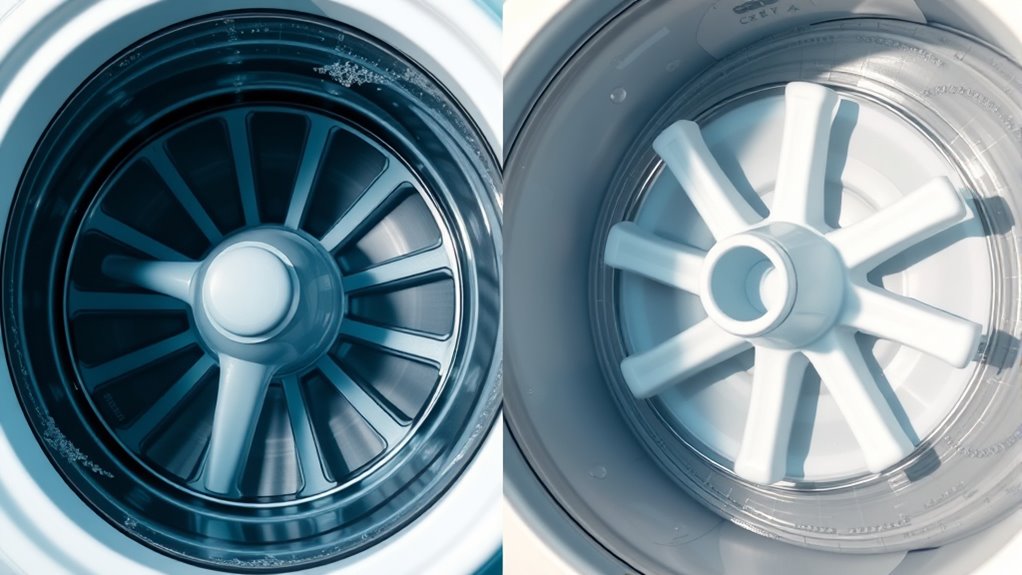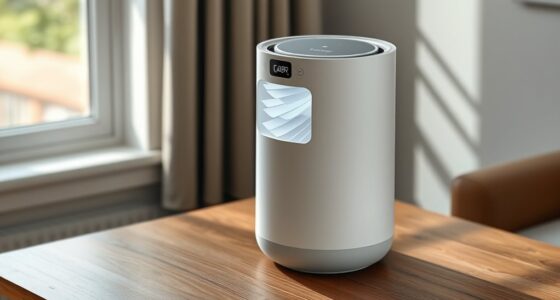In a clothes washer, agitators use vigorous back-and-forth rotation with fins to scrub clothes and remove heavy soils, while impellers create gentle water currents that lift and tumble fabrics for lighter cleaning. Agitators tend to use more water and can cause fabric wear, whereas impellers are more energy-efficient and gentle, helping preserve delicate textiles. To find out which system suits your laundry needs best, explore further for detailed differences and benefits.
Key Takeaways
- Agitators use vigorous mechanical rotation to rub clothes, delivering deep cleaning but increasing fabric wear.
- Impellers generate gentle water currents and swirling motions, providing effective cleaning with less fabric stress.
- Agitators are more suited for heavy soils and bulky items due to their strong mechanical action.
- Impellers excel at cleaning delicate fabrics and light soils with a gentler, water-based movement.
- Overall, agitators focus on aggressive soil removal, while impellers prioritize fabric preservation and water efficiency.
Basic Design and Motion of Agitators
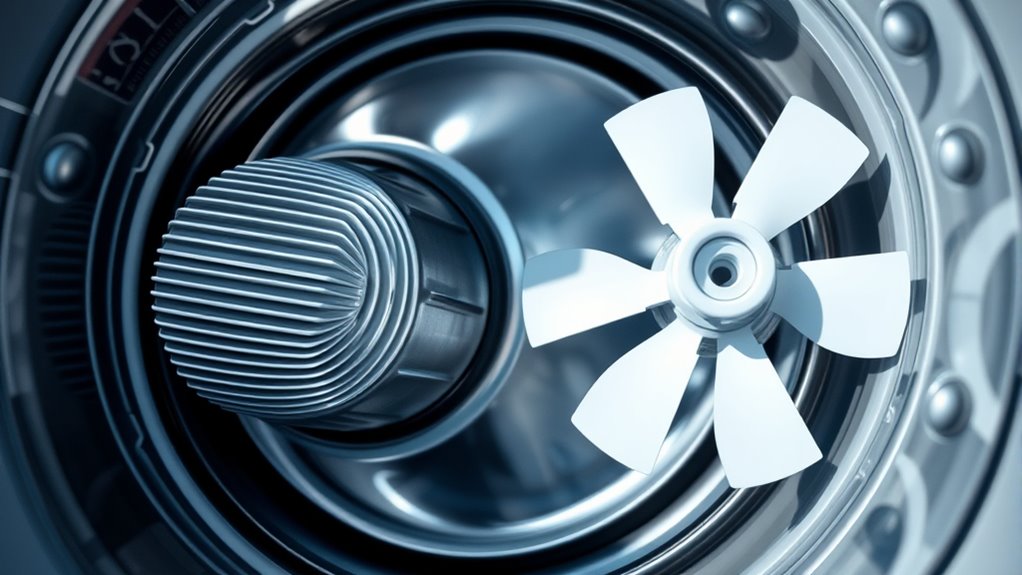
Agitators are central to traditional washing machines, featuring tall, spindle-shaped structures positioned in the middle of the wash drum. You’ll notice they often have fins or vanes that extend outward, designed to interact with your clothes. Constructed from durable materials, agitators are built to withstand constant use and vigorous cleaning. Their primary role is to rotate back and forth, creating friction that helps loosen dirt and stains. Positioned at the center of the wash basket and attached to a motor, they deliver a powerful, mechanical motion. Modern agitators have evolved, offering customizable settings for different loads and improved performance. Agitators are designed to tackle heavy loads This design ensures thorough cleaning, especially for heavily soiled or bulky items, making agitators a key component in effective laundry routines. Additionally, the rotation mechanism is engineered to maximize water and detergent circulation, enhancing cleaning efficiency.
Fundamental Operation of Impellers
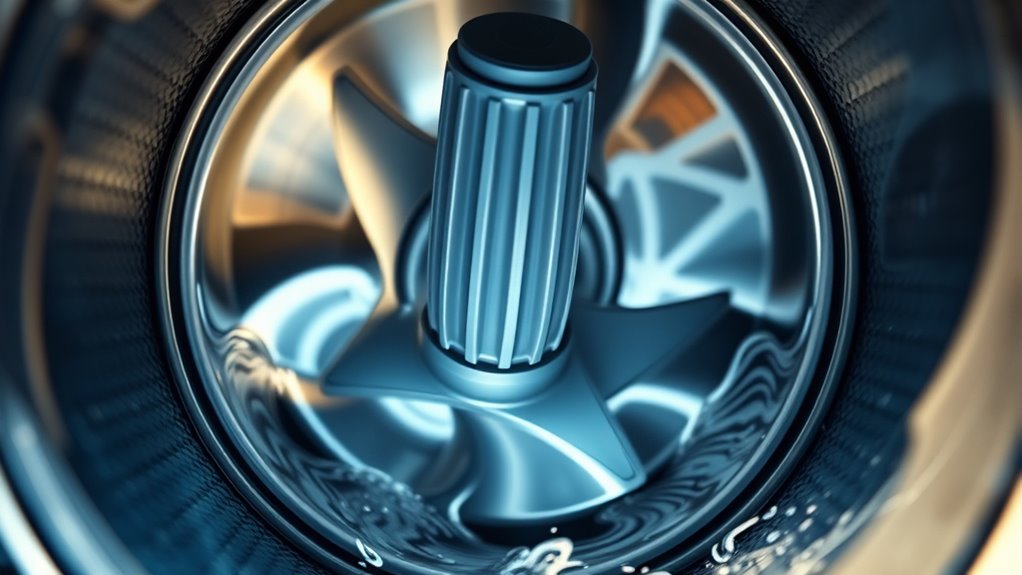
When you run an impeller, it creates water currents that move clothes efficiently through spin-induced flows. These currents promote better fabric interaction by rubbing clothes against each other, helping dislodge dirt gently. This design also uses less water, maximizing cleaning while conserving resources. Impeller washers are also known for their larger capacity and gentler handling of delicate fabrics. Additionally, the water circulation process enhances cleaning effectiveness by evenly distributing the detergent and water throughout the load. Proper water flow is essential for optimal performance and effective cleaning results.
Spin-Induced Water Currents
Have you ever wondered how impellers clean clothes so effectively with less water? It all comes down to spin-induced water currents. As the impeller rotates, it creates powerful currents that move clothes through the water, ensuring even exposure to cleaning agents. This circulation forces water through the wash basket, enhancing dirt and stain removal without needing extra water. The design of the impeller, often shaped as a disc or cone, helps generate efficient water flow and movement. These currents keep clothes in constant motion, rubbing against each other gently, which improves cleaning while minimizing fabric wear. High spin speeds increase water extraction, reducing drying time. Overall, these currents maximize cleaning efficiency, conserve water, and support energy savings—all thanks to the clever mechanics of spin-induced water movements.
Fabric Interaction Dynamics
Impellers create wash currents by spinning a low-profile cone or disc at the bottom of the tub, moving clothes primarily through water flow and fabric-to-fabric contact. This movement causes garments to swirl from the outer rim toward the center, gently rubbing against each other. The turbulence generated improves detergent distribution and soil removal without harsh mechanical scrubbing. The absence of an agitator pole allows clothes to tumble freely, promoting even friction and reducing fabric stress. This dynamic encourages fabrics to flex, rub, and lift dirt particles into the wash water. Additionally, the fabric interaction facilitated by impellers is gentle on delicate textiles, helping to preserve their lifespan. The following table highlights key aspects of fabric interaction:
| Aspect | Effect |
|---|---|
| Fabric rubbing | Dislodges soils gently |
| Water volume | Optimized for effective friction |
| Load distribution | Ensures even cleaning across fabrics |
| Fabric care | Minimizes fiber damage |
Furthermore, the efficient movement of water and fabrics enhances the overall cleaning effectiveness, ensuring garments are thoroughly washed while maintaining fabric integrity.
Water Efficiency Principles
The fundamental operation of impellers centers on creating water currents that move clothes efficiently through the wash cycle while using minimal water. By optimizing water levels, impeller washers reduce overall water consumption compared to traditional agitator models. These currents generate friction between clothes, enhancing cleaning without excessive soaking. Some models include a deep water wash option for heavily soiled loads, balancing water efficiency with cleaning power. High-speed spin cycles extract more water from clothes, decreasing drying time and water use overall. The impeller’s rotation creates swirling water flows that gently move fabrics, relying on water as a medium for friction rather than soaking. This design maximizes cleaning performance while conserving water, aligning with eco-friendly principles and reducing energy costs. Additionally, the use of natural materials like wood and linen in farmhouse bedrooms emphasizes sustainability and environmental consciousness, paralleling the water-saving ethos of impeller washers. Understanding the water flow mechanics involved helps consumers choose models that best suit their cleaning needs and environmental values.
Water Usage and Cycle Duration
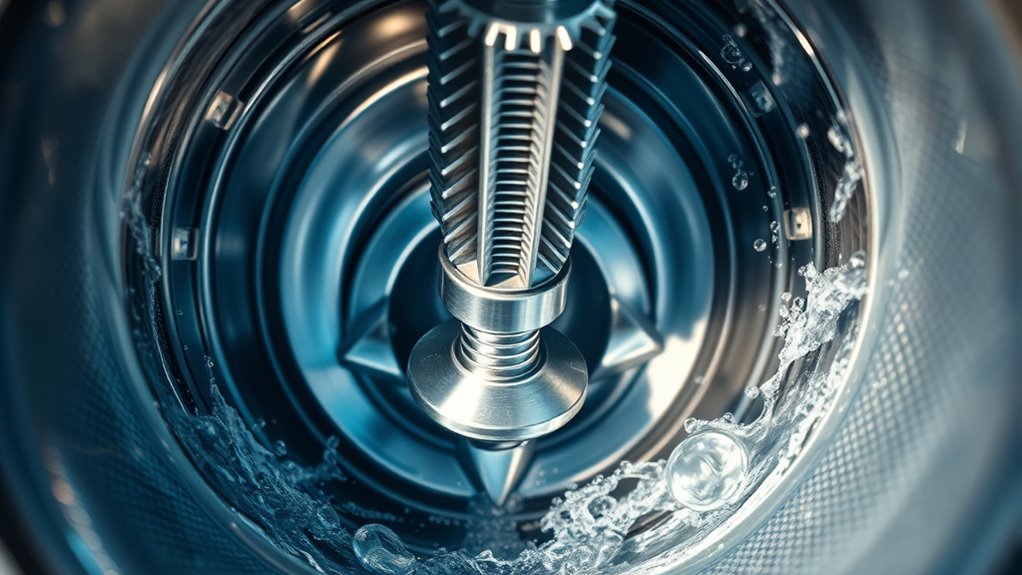
Choosing between an agitator and an impeller washer considerably impacts water use and cycle length. Agitator washers use more water because they need enough to fully submerge clothes and allow the central post to move them effectively. Impeller washers operate with less water, relying on low water levels and friction to clean clothes, which typically results in longer cycles. Although these longer cycles may seem less efficient, they often include high-speed spins that extract more water, reducing drying time. Some impeller models offer “deep water wash” options for heavily soiled loads, balancing water use and cleaning power. Additionally, the design of impeller washers utilizes efficient cleaning mechanisms that contribute to their water-saving features. Overall, impeller washers conserve water and energy, even if their cycles last longer, making them a more environmentally friendly choice. Using expert voice actors in advertising can help communicate these benefits more effectively to consumers.
Soil Removal Efficiency on Different Fabrics
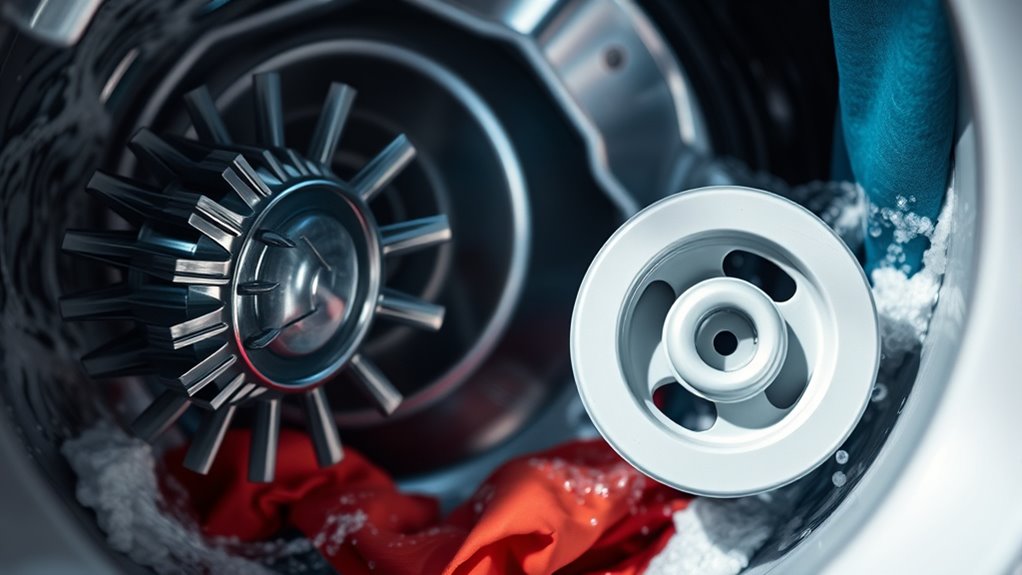
When it comes to soil removal on different fabrics, the mechanical action of your washer plays a crucial role. Agitators deliver superior cleaning power on heavily soiled items by physically rubbing and breaking apart dirt and stains through a twisting motion. This aggressive action effectively tackles tough stains on work clothes and outdoor wear. However, agitators’ force may cause more wear on delicate fabrics. Impellers provide gentler cleaning by creating currents that rub clothes against each other, which is ideal for delicate or lightly soiled items. Some impeller washers include deep water options to boost stain removal on heavily soiled fabrics. Overall, agitators excel with heavy soils and thicker fabrics, while impellers focus on protecting delicate fabrics and providing efficient cleaning for lighter soils.
Impact on Fabric Durability and Wear
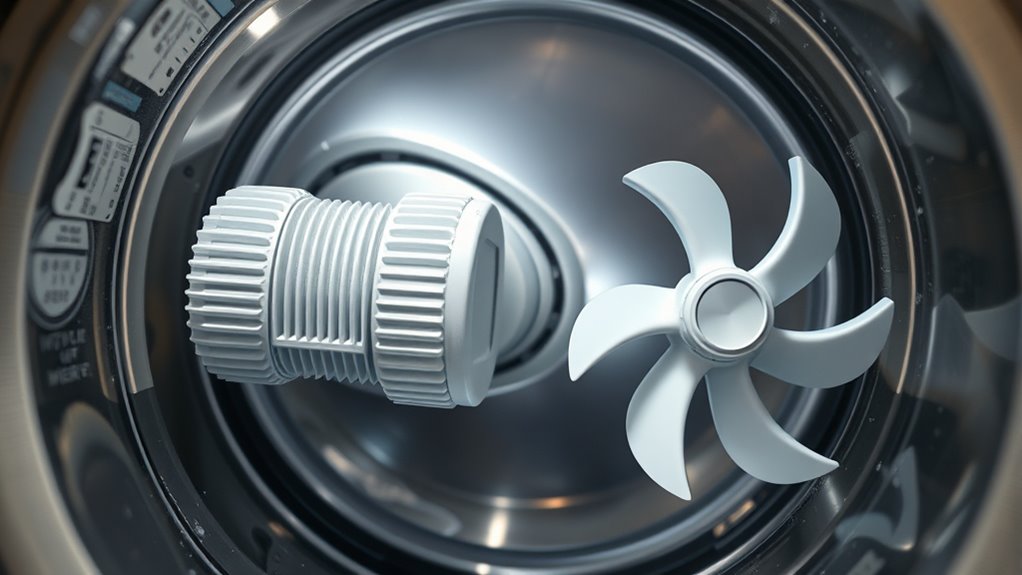
The mechanical action in your washer directly affects how fabrics wear over time. Agitators create high friction that can accelerate fiber damage, especially on delicate clothes. In contrast, impellers gently move clothes with less stress, helping fabrics last longer.
Mechanical Action Intensity
Mechanical action intensity markedly influences fabric durability during laundry cycles. Agitator washers deliver vigorous twisting and back-and-forth motions that create strong friction against fabrics, which can accelerate wear. This aggressive mechanical action often results in pilling, snagging, stretching, and abrasion, especially with delicate textiles. The central post agitator’s intense movements can cause localized fabric bunching and fiber stress, increasing the risk of damage over time. In contrast, impeller washers use a gentler, fabric-to-fabric rubbing motion, reducing physical stress on fibers. Their softer mechanical action helps preserve fabric integrity and extend garment lifespan. Since impellers generate less physical force, they are more suitable for delicate or sensitive fabrics, whereas agitators are better suited for heavy soils on durable textiles. Your choice impacts how fabrics wear over multiple cycles. Additionally, the prominence of WWE Raw’s financial impact underscores how different industries can influence perceptions of value and longevity, much like choosing a washer that best protects your garments. Considering filter replacement indicators and proper maintenance can further enhance the longevity of your appliance and the fabrics you care for.
Fabric Damage Risk
Fabric damage risk varies substantially between agitator and impeller washers due to differences in mechanical contact. With an agitator, your clothes repeatedly rub against the central spindle, increasing abrasion. This can cause fiber wear, pilling, and weaken delicate fabrics over time. Conversely, impeller washers use a low-profile disc that moves clothes gently with water currents, reducing direct fabric contact. This gentler action helps preserve fabric integrity, especially for delicate items. The key differences include:
- Agitators increase fiber wear due to direct contact and rubbing.
- Impellers minimize mechanical abrasion, protecting fabric surfaces.
- Agitator cycles tend to cause more stretching and snags.
- Impeller washers better maintain fabric elasticity and color.
Capacity and Load Handling
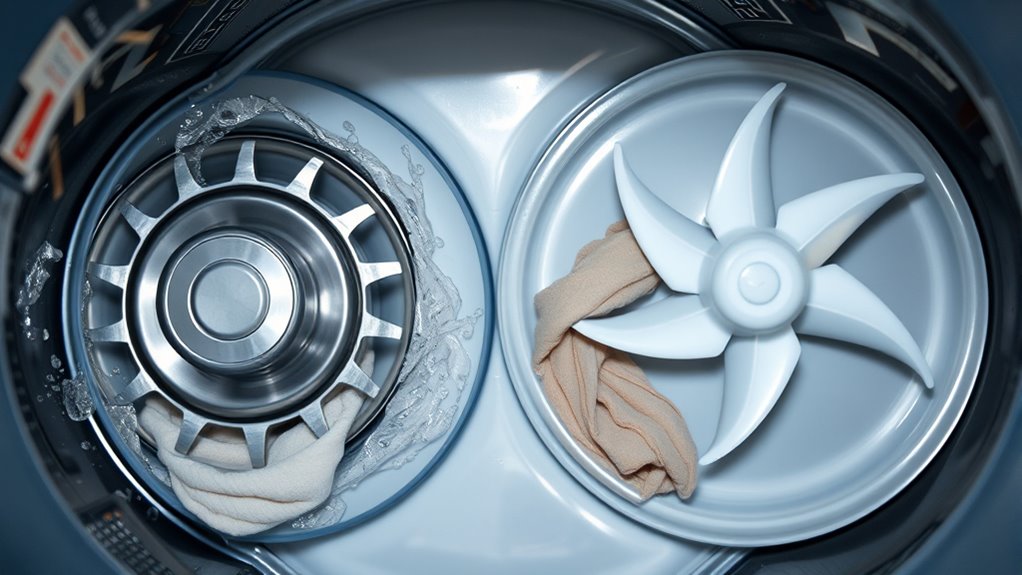
Impeller washers typically offer larger usable drum space because they lack the bulky central post found in agitator models. This design allows you to load bigger or bulkier items like bedding and large towels more comfortably. While agitator washers have limited capacity due to the central column, they’re often better suited for smaller loads or typical household laundry sizes. The higher capacity of impeller models means fewer wash cycles are needed for large loads, saving you time. Additionally, impeller washers handle different load types more efficiently because of their gentler currents, making them ideal for delicate fabrics and mixed loads. The design advantages of impeller washers contribute to their overall flexibility and efficiency. Overall, impeller washers give you more flexibility for handling larger and bulky items without sacrificing performance. Furthermore, the quality of materials used in impeller washers can influence their durability and effectiveness over time.
Energy Consumption and Washing Effectiveness
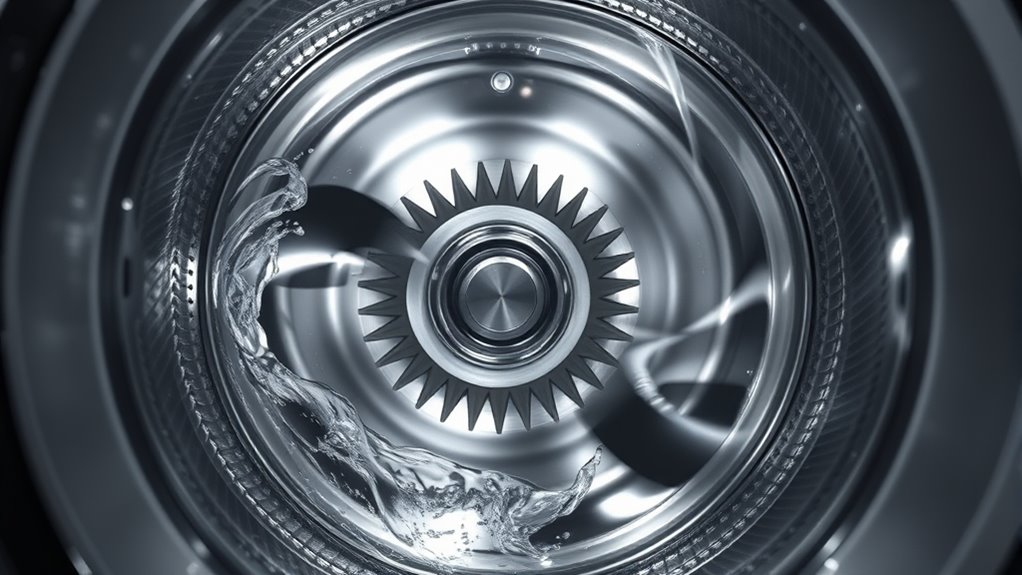
While both types of washers aim to clean effectively, impeller models generally use less water and energy than traditional agitator machines. This efficiency comes from their design, which optimizes water use and reduces energy consumption. Consider these points:
- Impeller washers typically consume about 45% less energy, thanks to lower water levels and efficient cycles.
- They operate with longer cycles but often include high-speed spins that cut drying energy needs.
- Agitator models use more water, increasing energy costs for heating and cycle operation.
- Since impellers use less water and detergent, they also reduce energy used in water heating and detergent processing.
Suitability for Various Laundry Loads
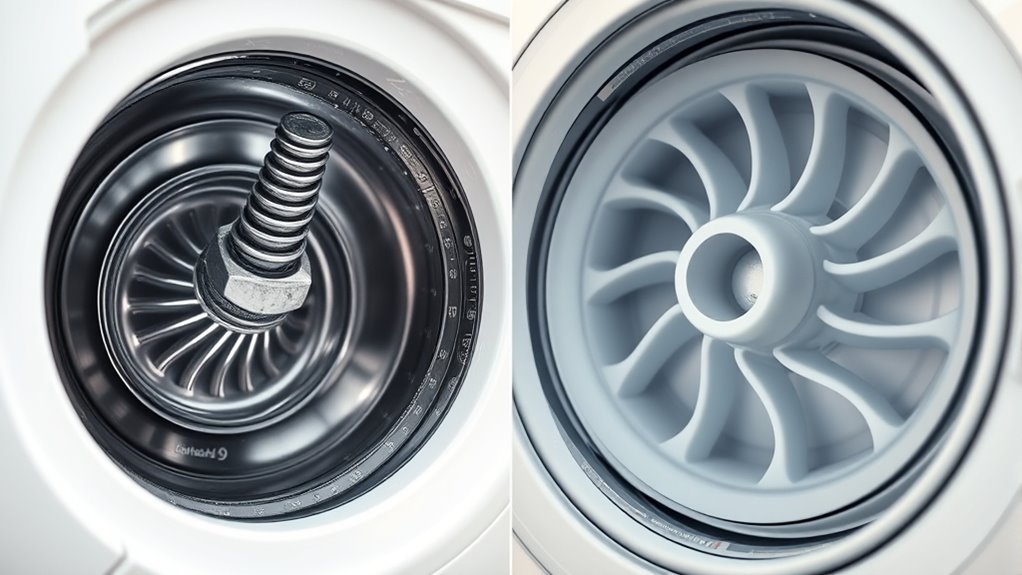
Agitator washers are particularly effective at cleaning heavily soiled and bulky laundry because their vigorous twisting action physically rubs and separates dirt from clothes. They work best with smaller to medium loads, as the central post takes up drum space, limiting capacity. You’ll find them ideal for heavily soiled work clothes or bulky items like bedding, thanks to their aggressive cleaning motion. Impeller washers, on the other hand, excel with lightly to moderately soiled clothes and larger loads, since their design offers more drum space and gentle movement. They’re better suited for delicate fabrics, reducing wear and tear. For big families or bulky items, impeller washers handle larger loads more efficiently, while agitators are better for heavily soiled, smaller laundry loads.
Advantages and Limitations of Each System
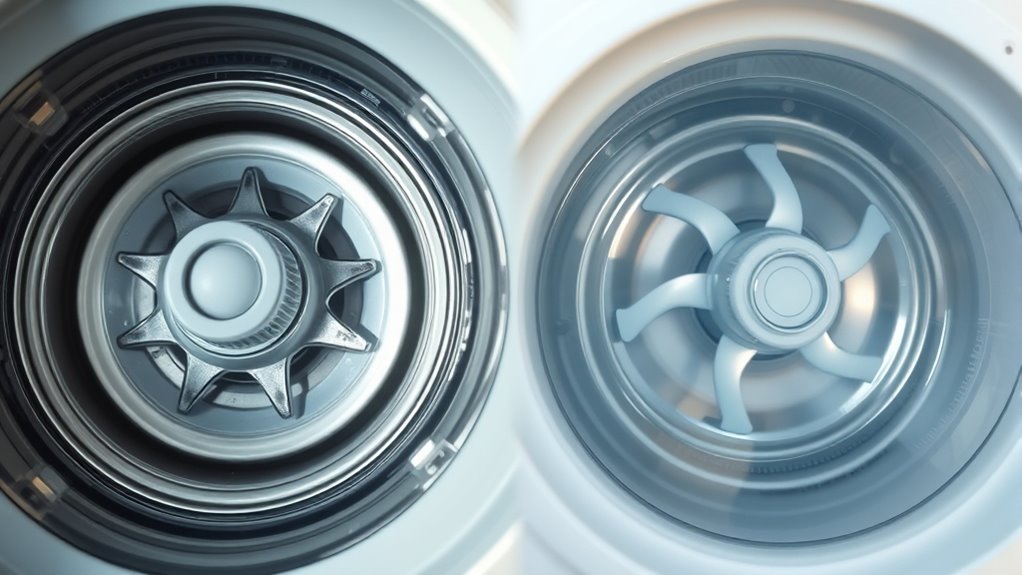
Both agitator and impeller washing systems offer distinct advantages that cater to different laundry needs.
- Agitators deliver vigorous cleaning, perfect for tough stains and heavy soils, thanks to their twisting motion.
- They typically have shorter wash cycles, boosting efficiency for frequent loads.
- Their robust agitation handles bulky items like blankets with ease.
- They’re durable with fewer mechanical failures, making them a long-term choice.
- Additionally, the choice between these systems can influence the overall cultural impact of technology on artistic expression and creativity.
- It’s important to consider water and energy consumption, as different systems have varying efficiencies that can affect utility bills and environmental impact.
However, agitators have limitations, such as reducing drum capacity and causing more fabric wear over time. They also use more water and energy and tend to be noisier. Impeller systems, on the other hand, are gentler, save resources, and provide larger load capacity but may require longer cycles and more maintenance. Both systems suit different priorities, depending on your laundry needs.
Frequently Asked Questions
How Do Agitator and Impeller Washers Differ in Cleaning Delicate Fabrics?
You’ll find that agitator washers clean delicate fabrics more aggressively, using vigorous twisting motions that can cause wear over time. Impeller washers, on the other hand, offer gentler cleaning by spinning a low-profile disc, creating smoother currents. This means your delicate clothes stay in better shape with impellers, thanks to their longer, more gentle cycles and larger capacity, reducing stress and preserving fabric integrity better than agitators.
Which Washer Type Is More Energy-Efficient for Large Laundry Loads?
If you’re aiming for energy efficiency with large loads, impeller washers are your best bet. They use less water, lower energy, and maximize drum space, meaning you save on heating and drying costs. Their gentle, thorough cleaning handles bulky items without wasting resources, making them a smarter, more sustainable choice. Plus, their high spin speeds extract more water, speeding up drying and reducing overall energy use.
Can Impeller Washers Handle Heavily Soiled or Stained Clothing Effectively?
Impeller washers can handle heavily soiled or stained clothing, but they may need extra effort. You should use longer cycles, higher water levels, or pre-treat stains for better results. Because they rely on fabric rubbing rather than vigorous agitation, tough dirt might not come out as quickly. However, with proper settings and possibly additional washes, impeller washers can still clean heavily soiled clothes effectively while being gentle on fabrics.
Do Agitator Washers Cause More Fabric Damage Than Impeller Models?
Yes, agitator washers tend to cause more fabric damage than impeller models. As you load your clothes, you might notice the vigorous twisting motion of the agitator rubbing against delicate fabrics, leading to snagging or stretching over time. While newer designs try to minimize this with softer surfaces and gentler cycles, the direct mechanical action still poses a higher risk of wear compared to the more delicate, flowing motion of impeller washers.
Which System Offers Better Performance for Bulky or Oversized Items?
You’ll find impeller washers perform better with bulky or oversized items because they offer more drum space, reducing tangling and wrinkling. They gently move clothes against each other with turbulence, which is ideal for delicate fabrics. Plus, they use less water and energy, making them more efficient. Shorter cycle times and high spin speeds help remove moisture effectively, so your large items come out cleaner and drier, faster.
Conclusion
Choosing between an agitator and an impeller depends on your laundry needs. An agitator offers thorough cleaning, but may wear fabrics faster, while an impeller is gentler and more efficient with water. Think of it as choosing between a rough scrub and a delicate dance—each has its place. Ultimately, selecting the right system is like tending a garden; with the right touch, your clothes stay fresh and vibrant for years to come.
